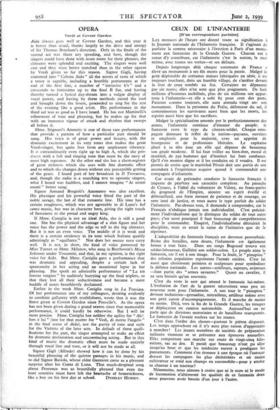OPERA
Verdi at Covent Garden Aida always goes well at Covent Garden, and this year it is better than usual, thanks largely to the drive and energy of Sir Thomas Beecham's direction. Only in the finale of the second act was there any speeding, and here, though the • singers could have done with more room for their phrases, the climaxes were splendid and exciting. The singers were well cast and they were better matched than in the other operas by Verdi given so far this season. Signor Gigli, having crammed into " Celeste Aida " all the errors of taste of which a tenor is capable, including a horrible portamento at the end of the first line, a number of " intrusive h's " and a crescendo to fortissimo up to the final B flat, and having thereby turned a lyrical day-dream into a vulgar display of vocal power, and having by these methods raised the roof and brought down the house, proceeded to sing for the rest of the evening like a good artist. His performance in the third act was as good as I have heard. He has not Martinelli's refinement of tone and phrasing, but he makes up for that with an immense vigour of attack and rhythm that sweeps all before it.
Mme. Stignani's Amneris is one of those rare performances that provide a pattern of how a particular part should be sung. Her voice is of great power and beauty, with the dramatic excitement in its very tones that makes the great Verdi-singer, but quite free from any unpleasant vibrancy. It is extraordinarily even right up to high A, which she pro- duces with a full and ringing tone that must be the envy of most high sopranos. At the other end she has a chest-register of great richness which she uses with fine dramatic effect and to which she changes down without any perceptible grating of the gears. I heard part of her broadcast in 11 Trovatore, and, though the radio is a searching test to operatic singers, what I heard was faultless, and I cannot imagine " Ai nostri monti " better sung.
Signor Armand Borgioli's Amonasro was also excellent. His physique and his powerful voice fitted the part of the noble savage, the last of that romantic line. His tone has a certain roughness, which was not agreeable in di Luna's bel cento music, but was in character here, giving the right touch of fierceness to the proud and angry king.
If Mme. Caniglia is not an ideal Aida, she is still a good one. She has the physical advantage of a slim figure and her voice has the power and the edge to tell in the big climaxes. But it is not an even voice. The middle of it is weak and there is a certain stridency in its tone which Italians qualify
admiringly as " squillante." Nor does her mezzo voce carry well. It is not, in short, the kind of voice possessed by Miss Turner or Mme. Milanov, who sang in Beethoven's Missa Solennis under Toscanini, and that, in my opinion, is the right voice for Aida. But Mme. Caniglia gave a performance that was dramatic and appealing, despite a certain lack of spontaneity in her acting and an occasional lapse in her phrasing. She spoilt an admirable performance of "La tra foreste vergine " by suddenly hurrying up the final triplets, so that they lost all their seductiveness and became a mere huddle of note's breathlessly declaimed.
Earlier in the week Mme. Caniglia sang in La Traviata.
Of her performance one of my colleagues, desiring evidently to combine gallantry with truthfulness, wrote that it was the finest given at Covent Garden since Ponselle's. As the opera has not been given during a grand season since that memorable performance, it could hardly be otherwise. But I will be more precise. Mme. Caniglia has neither the agility for " Ah ! fors é lui" (nor for that matter for " Vedi, di morte Tangelo " in the final scene of Aida), nor the purity of tone and style for the Violetta of the later acts. In default of these quali- fications for the part, the singer attempted to make an effect by dramatic declamation and unconvincing acting. But in this kind of music the dramatic effect must be made entirely through vocal line and tone, or it will not be made at all.
Signor Gigli (Alfredo) showed how it can be done by his beautiful phrasing of the quieter passages in his music, and so did Signor Basiola, whose elder Germont came as a pleasant surprise after his Conte di Luna. That much-despised song about Provence was so beautifully phrased that even the least sensitive must have felt the heartache of homesickness,
like a boy on his first day at school. DYNELEY HUSSEY.










































 Previous page
Previous page